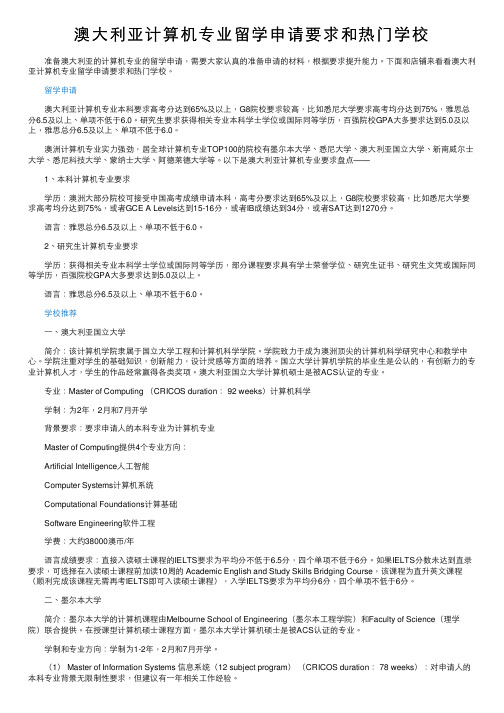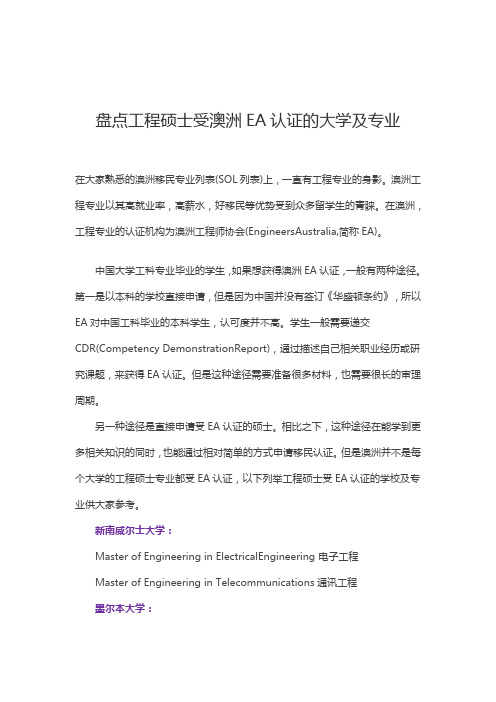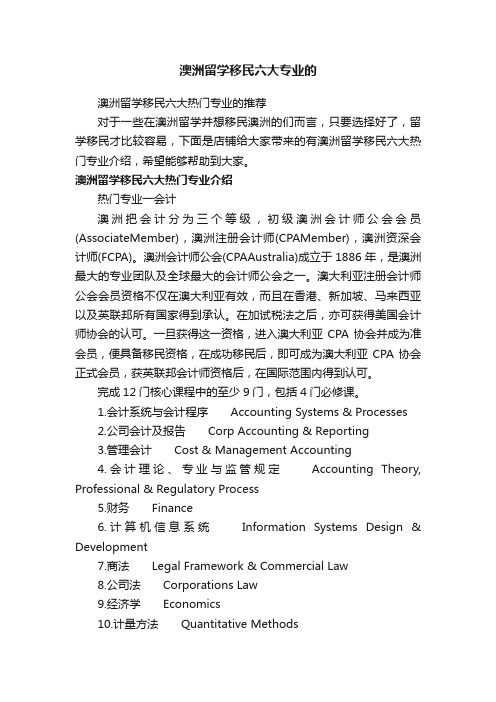墨尔本大学软件工程
- 格式:doc
- 大小:44.50 KB
- 文档页数:2

软件工程介绍--英文版Software Engineering IntroductionSoftware engineering is a discipline that focuses on the design, development, maintenance, and testing of software systems It plays a crucial role in today's digital age, where software is an integral part of almost every aspect of our lives, from communication and entertainment to business and healthcareThe importance of software engineering cannot be overstated In a world that increasingly relies on technology, software needs to be reliable, efficient, and userfriendly Poorly developed software can lead to significant problems, such as system crashes, security breaches, and user dissatisfaction This is where software engineers come in – they apply scientific and engineering principles to ensure that software meets the highest standards of qualityOne of the key aspects of software engineering is the software development life cycle (SDLC) This is a structured process that typically includes several phases, such as requirements gathering, design, implementation, testing, and maintenance During the requirements gathering phase, software engineers work closely with stakeholders to understand their needs and expectations for the software This involves identifying the functions the software should perform, the users it will serve, and any constraints or limitationsThe design phase is where the overall architecture and structure of the software are planned This includes decisions about the software'scomponents, interfaces, and data structures A welldesigned software systemis modular, scalable, and maintainable, making it easier to add new features and fix bugs in the futureImplementation is the actual coding of the software Software engineers use programming languages and tools to translate the design into working code They also need to follow best practices in coding, such as writing clear and understandable code, using proper naming conventions, and adding comments to explain the logicTesting is an essential part of the SDLC to ensure that the software functions correctly and meets the specified requirements Different types of tests are performed, including unit testing (testing individual components),integration testing (testing how components work together), and system testing (testing the entire software system) Bug fixes and optimizations are made based on the test resultsMaintenance is the ongoing process of supporting and improving the software after it has been deployed This may involve fixing bugs, addingnew features, adapting the software to changes in the environment or user needs, and ensuring its compatibility with new technologiesAnother important concept in software engineering is software design patterns These are reusable solutions to common software design problemsBy using design patterns, software engineers can improve the quality and efficiency of their code Some common design patterns include the singleton pattern, factory pattern, and observer patternAgile methodologies have also become popular in recent years in software engineering Unlike traditional waterfall models, which follow a sequential process, agile approaches emphasize flexibility and collaboration Teams work in short iterations, delivering working software frequently and responding quickly to changes in requirementsSoftware engineering also involves managing projects effectively This includes tasks such as scheduling, budgeting, resource allocation, and risk management Good project management skills are essential to ensure that software projects are completed on time and within budgetIn addition, software engineers need to be aware of ethical and legal considerations They must ensure that the software they develop respects privacy, security, and intellectual property rights They also have a responsibility to create software that is accessible to all users, regardless of their abilitiesFinally, the field of software engineering is constantly evolving New technologies, programming languages, and development paradigms emerge regularly Software engineers need to keep learning and staying updated to remain competent in their professionIn conclusion, software engineering is a complex and diverse field that requires a combination of technical skills, problemsolving abilities, and teamwork It is a discipline that has a significant impact on our modern society and will continue to play a crucial role in shaping the future of technology。

澳⼤利亚计算机专业留学申请要求和热⻔学校 准备澳⼤利亚的计算机专业的留学申请,需要⼤家认真的准备申请的材料,根据要求提升能⼒。
下⾯和店铺来看看澳⼤利亚计算机专业留学申请要求和热⻔学校。
留学申请 澳⼤利亚计算机专业本科要求⾼考分达到65%及以上,G8院校要求较⾼,⽐如悉尼⼤学要求⾼考均分达到75%,雅思总分6.5及以上、单项不低于6.0。
研究⽣要求获得相关专业本科学⼠学位或国际同等学历,百强院校GPA⼤多要求达到5.0及以上,雅思总分6.5及以上、单项不低于6.0。
澳洲计算机专业实⼒强劲,居全球计算机专业TOP100的院校有墨尔本⼤学、悉尼⼤学、澳⼤利亚国⽴⼤学、新南威尔⼠⼤学、悉尼科技⼤学、蒙纳⼠⼤学、阿德莱德⼤学等。
以下是澳⼤利亚计算机专业要求盘点—— 1、本科计算机专业要求 学历:澳洲⼤部分院校可接受中国⾼考成绩申请本科,⾼考分要求达到65%及以上,G8院校要求较⾼,⽐如悉尼⼤学要求⾼考均分达到75%,或者GCE A Levels达到15-16分,或者IB成绩达到34分,或者SAT达到1270分。
语⾔:雅思总分6.5及以上、单项不低于6.0。
2、研究⽣计算机专业要求 学历:获得相关专业本科学⼠学位或国际同等学历,部分课程要求具有学⼠荣誉学位、研究⽣证书、研究⽣⽂凭或国际同等学历,百强院校GPA⼤多要求达到5.0及以上。
语⾔:雅思总分6.5及以上、单项不低于6.0。
学校推荐 ⼀、澳⼤利亚国⽴⼤学 简介:该计算机学院⾪属于国⽴⼤学⼯程和计算机科学学院。
学院致⼒于成为澳洲顶尖的计算机科学研究中⼼和教学中⼼。
学院注重对学⽣的基础知识,创新能⼒,设计灵感等⽅⾯的培养。
国⽴⼤学计算机学院的毕业⽣是公认的,有创新⼒的专业计算机⼈才,学⽣的作品经常赢得各类奖项。
澳⼤利亚国⽴⼤学计算机硕⼠是被ACS认证的专业。
专业:Master of Computing (CRICOS duration: 92 weeks)计算机科学 学制:为2年,2⽉和7⽉开学 背景要求:要求申请⼈的本科专业为计算机专业 Master of Computing提供4个专业⽅向: Artificial Intelligence⼈⼯智能 Computer Systems计算机系统 Computational Foundations计算基础 Software Engineering软件⼯程 学费:⼤约38000澳币/年 语⾔成绩要求:直接⼊读硕⼠课程的IELTS要求为平均分不低于6.5分,四个单项不低于6分。

软件工程(双语)(最全)word资料软件工程(双语)Software Engineering课程编号:B0301101S学分: 3开课学院:计算机学院课内学时:48课程类别:专业基础课课程性质:必修一、课程的性质和目的Curriculum nature:The course is professional required course of Software Engineering Major.Object:The Software Engineering is the basis course of computer and related sciences. It is an engineering discipline where software engineers use methods and theory from computer science and apply it cost-effectively to solve difficult problems. This course presents a broad perspective on software engineering, such as software lifecycle, qualities of software, design, specification and verification of software, programming environments and tools, structural oriented programming and object oriented programming. Furthermore, the quality management, process improvement, software change, configuration management are also discussed.二、课程教学内容及基本要求(一)课程教学内容及知识模块顺序KNOWLEDGE UNIT 1: INTRO TO SOFTWARE ENGINEERING (2h)(1)Knowledge point 1 The Evolving Role of Software(2)Knowledge point 2 The Nature of Software(3)Knowledge point 3 Legacy SoftwareBasic requirement: Understand the basic conception of software engineering, master the Nature of software, master the definition of software engineering.KNOWLEDGE UNIT 2: A GENERIC VIEW OF PROCESS (4h)(1)Knowledge point 1 A Layered Technology(2)Knowledge point 2 A Process Framework(3)Knowledge point 3 The Capability Maturity Model IntegrationBasic requirement: Understand the conception of software processes, master the basic processes of software analyze,design, implement and test, understand the definition of CMMI.KNOWLEDGE UNIT 3: PROCESS MODELS (2h)(1)Knowledge point 1 Prescriptive Models(2)Knowledge point 2 Waterfall Model(3)Knowledge point 3 Incremental Process, Evolutionary Process(4)Knowledge point 4 Unified Process, Agile ProcessBasic requirement: Understand the various process models, such as waterfall model, Unified Process and Agile Process.KNOWLEDGE UNIT 4: REQUIREMENTS ENGINEERING (4h)(1)Knowledge point 1 Bridge to Design and Construction(2)Knowledge point 2 Requirements Engineering Tasks(3)Knowledge point 3 Initiating the Requirements Engineering Process(4)Knowledge point 4 Eliciting RequirementsBasic requirement: Master the steps of requirements engineering process, understand the role of abridge to design.KNOWLEDGE UNIT 5: THE ANAL YSIS MODEL (6h)(1)Knowledge point 1 Requirements Analysis Modeling(2)Knowledge point 2 Data, functional and Behavioral(3)Knowledge point 3 Flow-Oriented Modeling(4)Knowledge point 4 Object-Oriented ModelingBasic requirement: Master the conception and method of requirement analyze, understand the user requirement and system requirement, master the main content of Flow-Oriented and Object-Oriented Modeling.KNOWLEDGE UNIT 6: DESIGN ENGINEERING (4h)(1)Knowledge point 1 Design Process and Design Quality(2)Knowledge point 2 Design Concepts(3)Knowledge point 3 Design Model(4)Knowledge point 4 Design PatternBasic requirement: Master the steps of design engineering process, understand the role of a bridge to construction, understand the conception of design pattern.KNOWLEDGE UNIT 7: ARCHITECTURAL DESIGN (4h)(1)Knowledge point 1 Software Architecture(2)Knowledge point 2 Data Design(3)Knowledge point 3 Architectural Design(4)Knowledge point 4 Mapping Data Flow into a Software ArchitectureBasic requirement: Master the Structural Design method, including data flow diagram, data dictionary, and control models, understand the software design specification.KNOWLEDGE UNIT 8: COMPONENT-LEVEL DESIGN (6h)(1)Knowledge point 1 Designing Class-Based Components(2)Knowledge point 2 Conducting Component-Level Design(3)Knowledge point 3 Designing Conventional ComponentsBasic requirement: Understand the conception of components, Master the modular decomposition KNOWLEDGE UNIT 9: TESTING STRA TEGIES (4h)(1)Knowledge point 1 Software Testing Strategic(2)Knowledge point 2 Test Strategies for Conventional Software(3)Knowledge point 3 Test Strategies for Object-Oriented Software(4)Knowledge point 4 Validation Testing(5)Knowledge point 5 System TestingBasic requirement: Understand the basic definition of verification and validation, Master the steps of software testing process, Master the conventional software test strategies, understand the Object-Oriented Software test strategies.KNOWLEDGE UNIT 10: TESTING TACTICS (6h)(1)Knowledge point 1 Software Testing Fundamentals(2)Knowledge point 2 Black-Box and White-Box Testing(3)Knowledge point 3 Object-Oriented Testing MethodsBasic requirement: Understand the basis of software testing fundamentals, master the main contents of unit testing and integration testing, master the design of black-box and white-box testing. KNOWLEDGE UNIT 11: QUALITY MANAGEMENT (2h)(1)Knowledge point 1 Software Quality(2)Knowledge point 2 Software Quality Assurance(3)Knowledge point 3Software ReliabilityBasic requirement: Understand the definition of software Quality Management, master the basic method of software quality control.KNOWLEDGE UNIT 12: CHANGE MANAGEMENT (4h)(1)Knowledge point 1 Software Configuration Management(2)Knowledge point 2 SCM Process(3)Knowledge point 3 Version ControlBasic requirement: Understand the basic requirements of software change, understand the definition of software configuration management, master the version control.(二)课程的重点、难点及解决办法Curriculum focuses on the establishment of the basis theory of software engineering,and it is difficulty to design a suitable practical activity for the most students in software development process, making it better able to establish the basic theory and methods of software engineering. Therefore, students are organized in small groups as a unit. Teachers and students jointly build a development issue, gradually expand the development of practice activities, and use classroom-style assessment. The teach model can initiative to mobilize the students as possible.三、实验实践环节及基本要求1.实验实践教学环节在本课程中的作用及要求(实验教学大纲单独编写)The experimental practices of this course need to complete the software development process the main part of the three major activities and a supporting framework, including requirements analysis, software design, unit test and software configuration management. These experiments content is all software development activities have to be resolved, can be well reflected in software engineering theory, software development process needs of the technology practice.2.实验项目(具体要求见实验教学大纲)Experiment 1: Designing and Writing Software Requirements Specification (2h)Experiment 2: Designing and Writing Software Design Specification (2h)Experiment 3: Software Unit Testing (2h)Experiment 4: Software Configuration management (2h)四、本课程与其它课程的联系与分工The prep course of this course is data structure. This course is a follow-up to other professional courses on the basis of software engineering major.五、对学生能力培养的要求Through the course of study, students can establish the basic theories and methods of software engineering, master a certain requirement analysis, software design, development and testing capabilities, and master the basic theory of teamwork developed.六、课程学时分配Total 48 hours, including lectures 40 hours, experiments 8 hours. The main contents and distribution of course see the course hour’s allocation table.七、建议教材和教学参考书目1.教材《Software Engineering: A Practitioner’s Approach(英文精编版,第6版)》, Roger S. Pressman, 机械工业出版社,20202.主要参考书[1]《Software Engineering (8th Edition)》,Ian Sommerville,机械工业出版社,2020.[2]《软件工程(第8版)》,程成,陈霞,机械工业出版社,2020.[3]《软件工程:实践者的研究方法(本科教学版)》Roger S. Pressman,机械工业出版社,2020八、课程考核The course use close examination pattern. The academic performance mainly results from the final examination and the usual performance, which accounted for 70% of the final examination, usually performance accounted for 30%. Usually performance is mainly decided by working projects of the courses, supplemented by after-school work and attendance.九、说明In the teaching process, it is need to the divided students into a group of 3-6 people. They need to complete a software development project collaboratively with courses progress.执笔人:宗平审核人:陈志教学院长:孙力娟编写完成时间:2009年10月20日软件工程专业介绍培养目标:本专业培养适应社会发展需求,德、智、体、美全面发展,具有扎实的计算机应用理论和知识基础,掌握软件工程领域的前沿技术和软件开发方法,具有较强的实践能力和创新精神,具备较强的软件项目的系统分析、设计、开发和测试能力,能够按照工程化的原则和方法从事软件项目开发和管理的应用型人才。

盘点工程硕士受澳洲EA认证的大学及专业在大家熟悉的澳洲移民专业列表(SOL列表)上,一直有工程专业的身影。
澳洲工程专业以其高就业率,高薪水,好移民等优势受到众多留学生的青睐。
在澳洲,工程专业的认证机构为澳洲工程师协会(EngineersAustralia,简称EA)。
中国大学工科专业毕业的学生,如果想获得澳洲EA认证,一般有两种途径。
第一是以本科的学校直接申请,但是因为中国并没有签订《华盛顿条约》,所以EA对中国工科毕业的本科学生,认可度并不高。
学生一般需要递交CDR(Competency DemonstrationReport),通过描述自己相关职业经历或研究课题,来获得EA认证。
但是这种途径需要准备很多材料,也需要很长的审理周期。
另一种途径是直接申请受EA认证的硕士。
相比之下,这种途径在能学到更多相关知识的同时,也能通过相对简单的方式申请移民认证。
但是澳洲并不是每个大学的工程硕士专业都受EA认证,以下列举工程硕士受EA认证的学校及专业供大家参考。
新南威尔士大学:Master of Engineering in ElectricalEngineering 电子工程Master of Engineering in Telecommunications通讯工程墨尔本大学:Master of Engineering(Biomedical)生物医学Master of Engineering(Biomolecular)生物分子Master of Engineering(Chemical)化学工程Master of Engineering(Civil)土木工程Master of Engineering(Electrical)电子工程Master of Engineering(Environmental)环境工程Master of Engineering(Spatial)空间工程Master of Engineering(Mechanical)机械工程Master of Engineering(Mechatronics)机电一体化Master of Engineering(Software)软件工程Master of Engineering(Structural)结构工程需要注意的是,墨尔本大学工程类专业申请时需提交所有有关工程和技术(Engineering andTechnology)相关课程的完整的课程描述。

澳洲留学移民六大专业的澳洲留学移民六大热门专业的推荐对于一些在澳洲留学并想移民澳洲的们而言,只要选择好了,留学移民才比较容易,下面是店铺给大家带来的有澳洲留学移民六大热门专业介绍,希望能够帮助到大家。
澳洲留学移民六大热门专业介绍热门专业一会计澳洲把会计分为三个等级,初级澳洲会计师公会会员(AssociateMember),澳洲注册会计师(CPAMember),澳洲资深会计师(FCPA)。
澳洲会计师公会(CPAAustralia)成立于1886年,是澳洲最大的专业团队及全球最大的会计师公会之一。
澳大利亚注册会计师公会会员资格不仅在澳大利亚有效,而且在香港、新加坡、马来西亚以及英联邦所有国家得到承认。
在加试税法之后,亦可获得美国会计师协会的认可。
一旦获得这一资格,进入澳大利亚CPA协会并成为准会员,便具备移民资格,在成功移民后,即可成为澳大利亚CPA协会正式会员,获英联邦会计师资格后,在国际范围内得到认可。
完成12门核心课程中的至少9门,包括4门必修课。
1.会计系统与会计程序Accounting Systems & Processes2.公司会计及报告Corp Accounting & Reporting3.管理会计Cost & Management Accounting4.会计理论、专业与监管规定Accounting Theory, Professional & Regulatory Process5.财务Finance6.计算机信息系统Information Systems Design & Development7.商法Legal Framework & Commercial Law8.公司法Corporations Law9.经济学Economics10.计量方法Quantitative Methods11.审计Auditing & Assurance12.税法Taxation就业前景:会计师、精算师、银行职员、福利主管、企业家、金融分析师、金融规划师、投资银行职员、管理顾问、统计学家、贸易从业者、风险投资人。

澳洲八大it专业澳洲大学计算机专业可以分为软件工程方向、计算机科学、通信方向等E,其中计算机科学方向是澳洲大学开设最多的课程。
澳洲八大计算机科学专业最好的学校是墨尔本大学,其次是澳洲国立大学和阿德莱德大学等等(01)artificial intelligence 人工智能推荐大学:澳大利亚国立大学、墨尔本大学、新南威尔士大学、昆士兰大学(02)bioinformatics 生物信息学推荐大学:新南威尔士大学(03)business application development 商业应用开发推荐大学:莫纳许大学(04)business information systems 商业信息系统推荐大学:悉尼大学、莫纳许大学(05)business intelligence 商业智能推荐大学:莫纳许大学(06)computational modeling 计算机建模推荐大学:澳大利亚国立大学(07)computer networks 计算机网络推荐大学:悉尼大学、昆士兰大学、西澳大学、莫纳什大学、阿得雷德大学(08)computer science 计算机科学推荐大学:澳大利亚国立大学(09)computer systems 计算机系统推荐大学:澳大利亚国立大学、西澳大学(10)computer vision 计算机视觉推荐大学:阿得雷德大学(11)computing engineering 计算工程推荐大学:悉尼大学(12)computing science 计算科学推荐大学:澳大利亚国立大学、悉尼大学(13)corporate information and knowledge management 企业信息和知识管理推荐大学:莫纳许大学(14)database management systems 数据库管理系统推荐大学:悉尼大学去澳洲读计算机值得吗据立思辰留学360介绍,澳洲IT计算机等教育高质领先,在2018QS世界大学计算机与信息系统专业排名中,澳洲4所大学进入全球TOP50名单。
澳洲国立大学人工智能专业Bachelor of Advanced Computing (Honours)高级计算机学士学位学制4年(偏研究型)高级计算机学士学位里面细分专业包括 Intelligent Systems 智能系统专业。
根据该专业课程设置,学生将学习AI搜索,优化,知识表示,推理,规划,诊断,机器学习,文档分析,智能代理(强化学习,信息理论基础),数据驱动方法(挖掘,匹配,辩论,建模)和生物启发计算(神经网络,进化算法,人类脑力和脑力)。
成功完成该专业学习后,学生将能够:充分了解各种智能系统的途径;形成现实世界的问题,并选择最适合的方法来解决这个问题;实施智能系统算法并进行实证评估。
澳洲人工智能简介人工智能(Artificial Intelligence)是计算机科学的一个分支,它是研究、开发用于模拟、延伸和扩展人的智能的理论、方法、技术及应用系统的一门新的技术科学。
它企图生产出一种新的能以人类智能相似的方式做出反应的智能机器,该领域的研究包括机器人、语言识别、图像识别、自然语言处理和专家系统等。
立思辰留学360指出,而澳洲的科技研究发展水平一直位于全球领先水平,人工智能也是各高校近年重点的研发课题。
澳洲开设人工智能课程大学新南威尔士大学Bachelor of Computer Science计算机科学学士学位学制3年新南威尔士大学计算机科学学士学位里面细分了许多专业,如:数据库系统,电子商务,人工智能,程序编程,网络安全等。
学生必须从这些领域中选择一个为主修专业。
人工智能这个细分专业主要向同学们介绍人工智能的基础以及在现实世界中应用AI所需的核心技术(机械学,知识表述)。
课程结构:核心课程COMP1511编程简介(6 UOC)COMP1521计算机系统基础(6 UOC)COMP1531软件工程基础(6 UOC)COMP2511 O-O设计与编程(6 UOC)COMP2521数据结构和算法(6 UOC)COMP3121算法和编程技术(6 UOC)COMP3411人工智能(6 UOC)COMP3900计算机科学项目(6 UOC)COMP4920管理与伦理(6 UOC)MATH1081离散数学(6 UOC)MATH1131数学1A(6 UOC)MATH1231数学1B(6 UOC)选修课程COMP3431机器人软件架构(6 UOC)COMP4418知识表示(6 UOC)COMP9417机器学习和数据挖掘(6 UOC)COMP9418高级机器学习(6 UOC)COMP9444神经网络(6 UOC)COMP9517计算机视觉(6 UOC)墨尔本大学Bachelor of Science(Computing&Software Systems Major)理科学士学位(计算机&软件系统专业)学制3年墨尔本大学理科学士学位里面的计算机&软件系统专业中设置了人工智能的课程。
【导语】澳洲环境优美,社会福利好,所以很多留学⽣都希望毕业以后能留下来甚⾄定居在澳洲,所以在选择专业的时候就会倾向于选择可以为移民加分的专业。
以下是整理的澳洲移民加分的六⼤专业,欢迎阅读!【篇⼀】澳洲移民加分的六⼤专业 ⼀、会计 属澳洲紧缺职业,会计职业除了60分的技术移民专业分外,还可得到技术移民紧缺职业分15分的额外加分。
绝⼤部分⼤学都提供会计本科和硕⼠的课程,同时为本科⾮会计背景的学⽣提供直读会计硕⼠的机会。
会计课程突出的还有悉尼的和墨尔本的,其中迪肯⼤学制订了澳洲注册会计师协会的考试⼤纲。
⼆、信息技术(IT) 信息技术的许多专业分⽀都被列⼊60分的技术移民职业评估分。
包括很多专业⽅向,例如软件⼯程、络⼯程、信息系统、电⼦商务等。
不是所有学校IT专业都可获60分,要看是否获得计算机协会认证。
有墨尔本⼤学、莫那什⼤学、墨尔本皇家理⼯⼤学、和科廷理⼯⼤学等。
三、⼯程师 稳居技术移民职业评估60分,专业中建筑⼯程师、化学⼯程师、电⼒⼯程师、机械⼯程师、矿业⼯程师、⽯油⼯程师和地质勘探⼯程师等都是紧缺职业,可获15分额外分数。
该领域较的有⼤学、悉尼⼤学、悉尼科技⼤学和墨尔本⼤学等。
四、教师 初级教师⼊⾏起薪在4万澳元左右。
未来5年中澳政府⼩学、中学平均每年约2400名教师岗位空缺。
教师的职业评分也是60分,在最新紧缺职业名单上,幼⼉教育也被列⼊其中。
五、翻译 中⽂翻译和⼝译的职业空间很⼴。
有翻译资格的学⽣职业分是60分,⽽且第⼆语⾔有额外5分。
该专业较的有、麦考瑞⼤学、莫那什⼤学等。
六、技能类的职业 澳洲蓝领或灰领职业收⼊要⾼于⼀般⽩领,也不会低于专业⼈⼠。
技能类的很多职业是属于60分的职业,如平⾯印刷、护⼠、空调技师、⽛模技师等更是有15分的紧缺职业加分。
【篇⼆】澳洲405移民签证的介绍 以澳⼤利亚为例,澳⼤利亚虽然签证种类繁多,但往往都有年龄上限,澳洲政府希望更多对本⼟经济发展有利的⼈⼠移居澳洲,⽽不是单纯享受澳洲福利的⼈。
墨尔本大学University of Melbourne∙综合排名:2∙学校类型:公立-综合性大学∙所在地:澳大利亚维多利亚州墨尔本∙录取率:暂无统计∙每年学费:10万(人民币)∙是否有奖学金:是∙在校生人数:36843∙开学时间:秋季,春季∙学校网址:.au院校介绍院校简介墨尔本大学是澳洲最古老的大学之一,建立于1853年。
墨尔本大学是澳大利亚八大名校之一,也是21世纪大学联盟的创始会员和秘书处所在地,同时还是泛太平洋大学联盟(APRU)、亚太国际贸易教育暨研究联盟(PACIBER)的成员大学之一。
根据英国泰晤士报高等教育增刊《2005The Top200World University Rankings》,墨尔本大学高居全球第19位,2010年美国《美国新闻和世界报道》(USNWR),和英国QS最新世界排名38位。
共有在校生约36,843人。
男女比例均等,留学生约占27%。
教职员工7,627人,师资资源丰富,教学与科学水平极高院系介绍墨尔本大学的11个学院和墨尔本商学院及维多利亚学院提供了一流富有生机的学习环境。
主要课程有:建筑学,建筑与设计,人文学科,经济和商科,教育,工程,土地和食品资源研究院,法律,医学,牙科和健康科学,音乐,科学和兽医学。
墨尔本大学教学和学习都在多媒体教室,所应用的新技术和多媒体教材都是墨尔本大学的教师自己开发的学术实力墨尔本大学在许多学术领域都累积了优异的学术声望,尤其于医学、社会科学、艺术与人文及工程与科技领域,在澳洲和全世界都享有领先地位。
墨尔本商学院(Melbourne Business School〕的排名始终位居世界百强,被英国高级技术移民签证计划(Highly Skilled Migration Programme)列入世界前50大MBA课程,毕业生有直接赴英国工作的资格校园环境墨尔本(Melbourne)是澳大利亚和大洋洲仅次于悉尼的第二大城市,墨尔本是维多利亚州的首府澳大利亚主要的金融中心之一城市的绿化面积高,气候宜人曾连续多年被联合国人居署评为最适合人类居住的城市。
软件工程澳洲大学排名软件工程是一门研究用工程化方法构建和维护有效的、实用的和高质量的软件的学科。
澳洲开设软件工程专业众多,接下来一起看看澳洲软件工程专业排名,希望对大家有所帮助。
1、墨尔本大学软件工程专业2、澳洲国立大学软件工程专业3、新南威尔士大学软件工程专业4、悉尼大学软件工程专业5、昆士兰大学软件工程专业6、莫纳什大学软件工程专业7、皇家墨尔本理工大学软件工程专业8、阿德莱德大学软件工程专业9、昆士兰科技大学软件工程专业10、悉尼科技大学软件工程专业澳洲软件工程专业软件工程(softwareengineering,简称se),是一门研究用工程化方法构建和维护有效的、实用的和高质量的软件的学科。
它涉及程序设计语言、数据库、软件开发工具、系统平台、标准、设计模式等方面。
在现代社会中,软件应用于多个方面。
典型的软件有电子邮件、嵌入式系统、人机界面、办公套件、操作系统、编译器、数据库、游戏等。
同时,各个行业几乎都有计算机软件的应用,如工业、农业、银行、航空、政府部门等。
澳洲软件工程专业职业定义软件和应用程序员按照用户的要求、系统和技术规范,设计、开发,测试,维护程序代码澳洲软件工程专业工作内容调查、咨询、分析、评估系统方案的需求发现现有系统以及相关进程、程序和方法的技术局限性、低效现象根据现有测试协议,指导方针和质量标准,测试、调试、诊断并纠正应用程序语言中的错误和故障以确保程序和应用软件符合相关的规范编写、更新和维护技术方案,用户文档材料和运作程序对软件设计活动的开发提案和策略提供意见、指导和专业技术支持,如财务评估,软件购买和更新的成本计算澳洲软件工程职业前景分析师程序员,开发程序员,软件工程师澳洲软件工程专业职业评估移民评估协会:acs计算机评估移民评估要求:1,读完认证课程和2,一年职业年或者1年澳洲工作经验3,评估对雅思无要求。
墨尔本大学连年赢得最高份额的研究基金,奠定了它澳大利亚一流研究类大学的声誉,它成为维多利亚州同时整个澳洲甚至国际优秀学生的首选,墨尔本大学为学生提供了每年价值850万澳币的奖学金。
大学是Universitas 21(大学的国际性协会)的创建成员之一,它在教学和科研方面都享有声誉。
墨尔本大学软件工程专业基本信息:
QS世界排名1(15)学费$35,936申请截止日期10月31日TOEFL要求79本科均分要求65%以上可申请学期第一、二学期IELTS要求 6.5GRE要求Not Required工作经验要求无注:
(1)此处的排名是2018年QS计算机科学与信息系统专业的排名。
该榜单里墨尔本大学世界排名第15,澳洲排名第1
(2)墨尔本大学工程学院硕士项目——含授课型与研究型——接受双录取,TOEFL总分60分以上,写作18分以上,或IELTS总分6.0以上,单项不低于5.5分,学校将会自动考虑将学生录取至墨尔本大学语言桥梁课程(UMELBP)。
具体可见语言课程段的申请说明
(3)TOEFL单项要求:写作不低于21,口语不低于18,阅读与听力不低于13;IELTS单项要求:各项均不低于6.0分
(4)本科毕业于入选上交大世界大学术排名或泰晤士高等教育世界大学排名榜单的学校会比较有利;
未进入榜单学校的学生,GPA最好可以再高一点
(4)第二学期4月30日截止
申请说明
据立思辰留学360介绍,墨尔本大学软件工程(Software Engineering)授课型项目设于计算与信息系统系(Department of Computing & Information Systems)下,共设有以下两个项目,分别是:
软件工程硕士(Master Of Engineering (Software))
软件工程硕士-商学(Master Of Engineering (Software With Business))
上述项目均无需工程专业背景,为期2-3年。
本科工程专业毕业的学生只需修读2年,本科非工程专业的学生一般需修读3年。
上述两个项目均无本质区别,二者的课程设置也大体相同。
区别在于后者会需要修读一些商科或经济学相关的课程。
前置课程要求:
墨尔本大学软件工程授课型项目要求申请者本科学习过一下课程:数学(Mathematics)
计算(Computing)
计算机编程(computer science programming)。